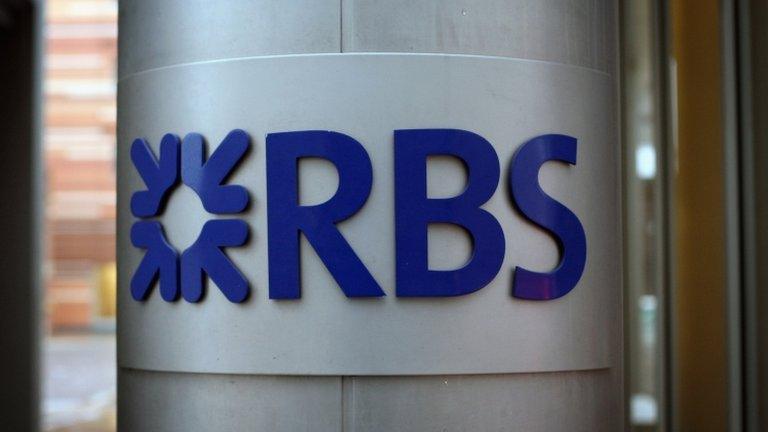RBS shares surge after it reports a surprise rise in profit
- Published
"Still a lot to do": RBS boss Ross McEwan on latest profit results
Shares in Royal Bank of Scotland (RBS) have jumped after the bank said it expects pre-tax profits to double to £2.65bn for the first half of the year.
RBS said it set aside much less money for bad loans than it had expected to do - £269m down from £2.15bn.
A government bail out of the bank in 2008 left the taxpayer owning 80%.
RBS chief executive Ross McEwan told the BBC the bank was benefitting from an improved economy and from consumers and businesses becoming more confident.
RBS shares rose more than 10% to 364.20p, the biggest rise in four years. The government paid around 500p a share at the time of the bail out so re-selling the shares to private investors looks a long way off.
The company said it released its results a week early because they were significantly stronger than the market was expecting.
"These results show that underneath all the noise and huge restructuring of recent years, RBS is a fundamentally stronger bank that can deliver good results for customers and shareholders," Mr McEwan said in a statement.
Markets 'shocked'
A general pickup in the UK economy helped to improve the value of RBS loans, the company said.
Plus, in the first six months of the year RBS had to put aside less than it had expected for compensation.
It set aside £150m for Payment Protection Insurance (PPI) mis-selling claims and £100m for other mis-selling claims.
Mr McEwan said the company still faced "significant conduct and litigation issues" but stressed that RBS was now a much simpler and more customer-focused bank.
"Trust in this industry has been so eroded, I think it will take at least five years to get it back to where it was 10 or 15 years ago," he added.
RBS has already put aside £3.8bn for legal costs in its annual results, including a £1.9bn provision for fines and damages relating to mis-selling mortgage bonds in the US, as well as other penalties relating to market manipulation.
Richard Hunter, head of equities at Hargreaves Lansdown Stockbrokers, said that RBS half year results were unexpectedly strong, and a "significant milestone in RBS' return to financial health."
'Bad bank' makes good
"In stark contrast to its recent history, RBS has today shocked the market positively," he said. "Such was the strength of the impending results as compared to market expectations, the company felt compelled to release the numbers early."
RBS Capital Resolution, the so-called 'bad bank' within RBS that was created to take on the bank's riskier assets, made an overall loss in the first six months of £48m.
However, in the second quarter, the bank made a profit of £66m, with the value of its bad loans increasing by £128m.
A general improvement in the UK economy was one of the main reasons that the market value of its toxic assets went up, the bank said.
In addition, Ulster Bank, which has been one of the weakest parts of the RBS Group, made a profit of £55m in the first half of the year. The bank made a loss of £381m in the same period last year.
- Published25 April 2014
